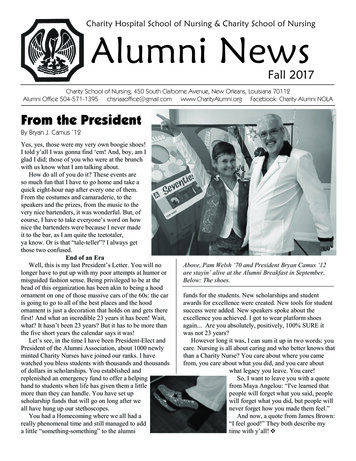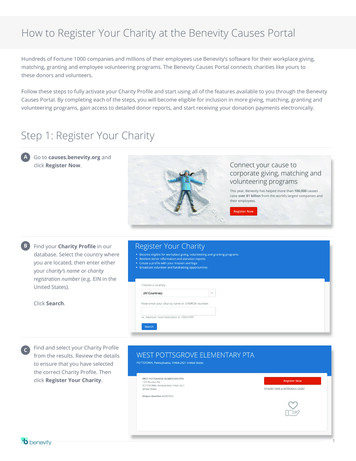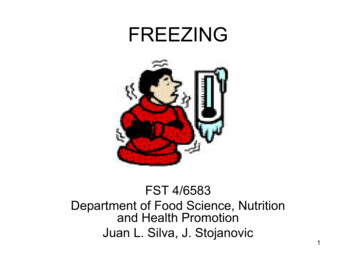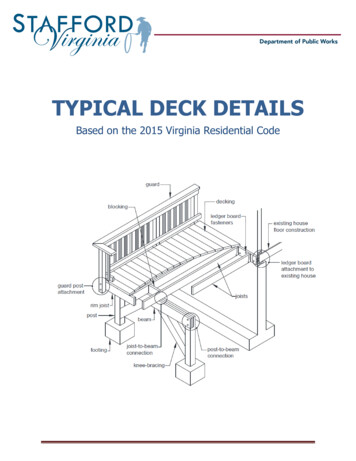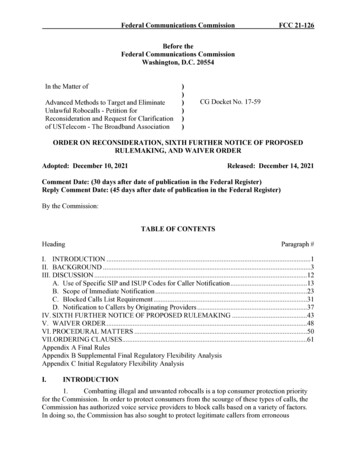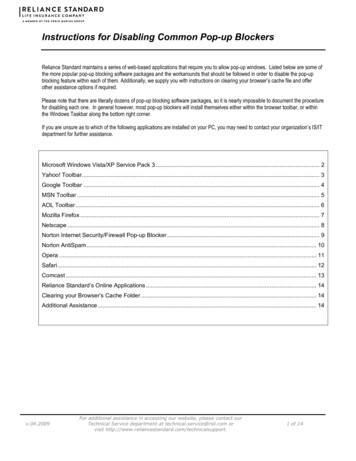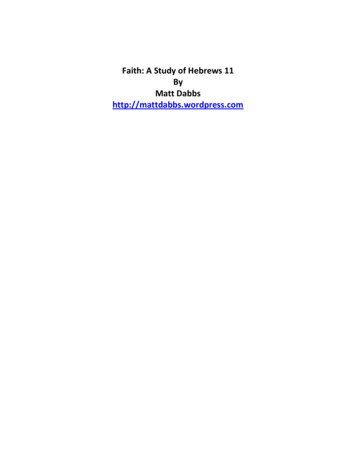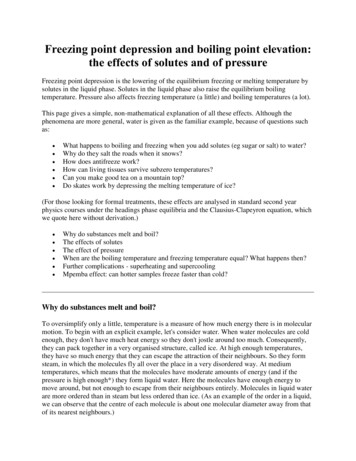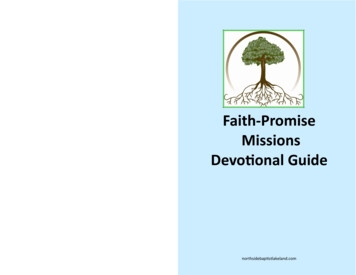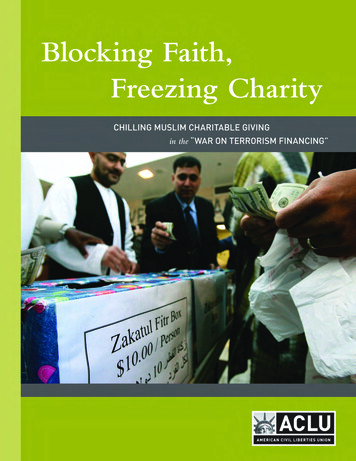
Transcription
Blocking Faith,Freezing CharityCHILLING MUSLIM CHARITABLE GIVINGin the“WAR ON TERRORISM FINANCING”
Blocking Faith, Freezing Charity:Chilling Muslim Charitable Giving in the “War on Terrorism Financing”PUBLISHED: June 2009FRONT COVER PHOTOGRAPH: Alex Wong/Getty ImagesMembers of a Muslim congregation in Virginia give Zakat donations for the needy beforethey enter a mosque for a service to mark the conclusion of the holy month of Ramadan, theheight of annual Muslim charitable giving. Zakat is one of the core “five pillars” of Islam anda religious obligation for all observant Muslims.BACK COVER PHOTOGRAPHS:LEFT: Brandon Dill/Memphis Commercial AppealRIGHT: LIFE for Relief and DevelopmentTHE AMERICAN CIVIL LIBERTIES UNION is the nation’s premier guardian of liberty, workingdaily in courts, legislatures and communities to defend and preserve the individual rightsand freedoms guaranteed by the Constitution, the laws and treaties of the United States.OFFICERS AND DIRECTORSSusan N. Herman, PresidentAnthony D. Romero, Executive DirectorRichard Zacks, TreasurerACLU NATIONAL OFFICE125 Broad Street, 18th Fl.New York, NY 10004-2400(212) 549-2500www.aclu.org
ContentsI. EXECUTIVE SUMMARY AND INTRODUCTION . 7a. Introduction.7b. Executive Summary.9c. Recommendations.17II. METHODOLOGY. 25III. LEGAL FRAMEWORK. 27a. Antiterrorism and Effective Death Penalty Act (AEDPA).28b. Expansion of Prohibited Material Support.29c. International Emergency Economic Powers Act (IEEPA)and Executive Order 13224.33d. OFAC’s Anti-Terrorist Financing Guidelines /Voluntary Best Practices for U.S.-Based Charities.35IV. LACK OF DUE PROCESS TO PROTECT AGAINST MISTAKE AND ABUSE. 39a. Denial of Due Process in Blocking Assets Pending Designation.39i. Case Study: KindHearts for Charitable Humanitarian Development:Assets Frozen for Over Three Years, But Never Designated.42b. Denial of Due Process in Designation of Charities.43c. Limited Judicial Review for Designations.44d. Flaws in Evidence Used in Designation.46e. Poor Record in Material Support Prosecutions.50i. Case Study: Global Relief Foundation:Use of Immigration Charges in Absence of Evidence to Indict.52f. Public Naming of Unindicted Co-conspirators.53g. Charities Held Liable for Damages in Unrelated Foreign Terrorism Lawsuits.55V. DISCRIMINATORY ENFORCEMENT OF COUNTERTERRORISM LAWSAGAINST AMERICAN MUSLIM CHARITIES. 59a. Discriminatory Enforcement against American Muslim Charities.60i. Case Study: Holy Land Foundation for Relief and Development:Criminalizing Support for Non-Designated Charities.61b. Disruptive Investigation or Public Raid of American Muslim Charities.64VI. INTIMIDATION OF MUSLIM DONORS BY LAW ENFORCEMENT. 69a. Law Enforcement Interviews of Muslim Donors.69b. Arrests, Prosecutions, and Public Smearing of Muslim Donors.73c. Surveillance of Donations at Mosques.75d. Government Refusal to Reassure Donors.78
VII. CHARITABLE GIVING IN ISLAM. 83a. Zakat as a Religious Obligation to Tithe.83b. Preferred Recipients of Zakat as Defined in Islam.86VIII. CHILLING EFFECT ON MUSLIM CHARITABLE GIVINGAND IMPACT ON RELIGIOUS FREEDOM. 89a. Chilling Effect on Charitable Giving (Zakat) Due to Climate of Fear.89i. Fear of Criminal Liability for Donations to Legal Charities.931. Case Study: The Story of Samir S.95ii. Fear of Interview by Law Enforcement.97iii. Fear of Immigration Consequences of Donating.100b. Inability to Donate Zakat to Preferred Recipientsin Accordance with Religious Beliefs.101c. Non-Muslim Charities Not an Adequate Option.105d. Religious Rights Violations Due to Continued Sequestering of Charities’ Funds.107IX. CHILLING EFFECT ON ASSOCIATION WITH MUSLIMCOMMUNITY AND RELIGIOUS ORGANIZATIONS. 111a. Limitations on Freedom of Association Due to Climate of Fear.111X. COLLATERAL CONSEQUENCES UNDERMINE COUNTERTERRORISM EFFORTS. 117a. Alienation of Muslim Americans.118b. Undermining U.S. Reputation and Diplomatic Efforts in Muslim Countries.120c. Proportionate Rise in Cash Donations.122d. Chilling Effect on Overseas Humanitarian Relief Efforts.124XI. INTERNATIONAL HUMAN RIGHTS AND CONSTITUTIONAL LEGAL STANDARDS. 131a. Religious Freedom.131b. Non-Discrimination.134c. Freedom of Association and Assembly.135d. International Law on Counterterrorism Measures.136XII. ACKNOWLEDGMENTS. 139XIII. ENDNOTES. 141
AID:American Convention on Human RightsAmerican-Arab Anti-Discrimination CommitteeAntiterrorism and Effective Death Penalty ActAl Haramain Islamic Foundation-USAAdministrative Procedures ActBenevolence International FoundationCoalition on American-Islamic RelationsInternational Convention on the Elimination of All Forms of Racial DiscriminationFederal Bureau of InvestigationForeign Intelligence Surveillance ActForeign Terrorist OrganizationGovernment Accountability OfficeGoodwill Charitable OrganizationGlobal Relief FoundationHoly Land Foundation for Relief and DevelopmentIslamic American Relief Agency-USAInternational Covenant on Civil and Political RightsInternational Committee of the Red CrossInternational Emergency Economic Powers ActImmigration and Nationality ActInternal Revenue ServiceIntelligence Reform and Terrorism Prevention ActIslamic Society of North AmericaDepartment of Justice Joint Terrorism Task ForceLife for Relief and DevelopmentLiberation Tigers of Tamil EelamMuslim Public Affairs CouncilNorth American Islamic TrustNon-governmental organizationDepartment of Treasury Office of Foreign Assets ControlDepartment of Justice Office of the Inspector GeneralKurdistan Workers’ PartyReligious Freedom Restoration ActSpecially Designated Global TerroristSpecially Designated Nationals and Blocked PersonsSpecially Designated TerroristDepartment of Treasury Office of Terrorist Financing and Financial CrimesTrading with the Enemy ActUnindicted co-conspiratorUniversal Declaration of Human RightsUnited NationsUnited States Agency for International Development
American Civil Liberties UnionThe government’s actions have created a climateof fear that chills American Muslims’ free and fullexercise of their religion through charitable giving,or Zakat, one of the “five pillars” of Islam and areligious obligation for all observant Muslims.6Blocking Faith, Freezing Charity
American Civil Liberties UnionI.Executive Summaryand Introductiona. IntroductionThe government’s actions against these three charities were the start of a pattern of conduct that violated the fundamental rights of American Muslimcharities and has chilled American Muslims’ charitable giving in accordance with their faith, seriouslyundermining American values of due process andcommitment to First Amendment freedoms.On September 24, 2001, President George W. Bushannounced in the White House Rose Garden that,in “a strike on the financial foundation of the global terror network,” he had taken executive action,without consulting Congress, to expand the Treasury Department’s unilateral authority to freezethe assets of organizations it considered terrorist organizations. He declared, “Just to show youhow insidious these terrorists are, they oftentimesuse nice-sounding, non-governmental organizations as fronts for their activities. We have targeted three such NGOs. We intend to deal with them,just like we intend to deal with others who aid andabet terrorist organizations.”1 Federal authoritiesannounced they were investigating over 30 Muslimcharities.2Without notice, and through the use of secretevidence and non-transparent procedures, theDepartment of the Treasury has closed six U.S.based, American Muslim charities to date by designating them as terrorist organizations. Theconsequences of designation include the seizureand freezing of all financial and tangible assets,as well as significant civil and criminal penalties.The federal government has closed down a seventhU.S.-based, American Muslim charity by declaringthe charity to be “under investigation” and freezing all its assets. In addition, at least six AmericanMuslim charities have been raided. Although thesesix charities have not been designated as terroristorganizations or had their assets frozen pursuantto a Treasury Department blocking order, they haveWithin the space of ten days in December 2001, thefederal government froze the assets of the threelargest Muslim charities in the United States—theHoly Land Foundation for Relief and Development,Global Relief Foundation, and Benevolence International Foundation—effectively shutting each ofthem down. The government seized these charities’assets during the Muslim holy month of Ramadan,at the height of annual Muslim charitable giving.These charities, which had been operating without incident for years—and for over a decade inthe case of the Holy Land Foundation—were noton any government watch list before their assetswere frozen. Indeed, before it was shut down theHoly Land Foundation had made repeated requeststo government officials for assistance in complyingwith the law, only to be rebuffed.Today, the Treasury Department hasvirtually unchecked power to designategroups as terrorist organizations.Terrorism financing laws are overlybroad and lack procedural safeguardsthat would protect American charitiesagainst government mistake and abuse.suffered as a result of publicly announced investigations, law enforcement raids, and intrusive surveillance; two of these charities have closed. Intotal, and as a result of these federal governmentactions, nine Muslim charities have been shutdown in Texas, Michigan, Missouri, Illinois, Oregon,Ohio, Massachusetts, and New York.Blocking Faith, Freezing Charity7
American Civil Liberties UnionAlthough the need to ensure that humanitarian aid and charitable donations are not divertedto support terrorism is a real and valid concern,both the terrorism financing laws and the government’s interpretation of them raise serious constitutional and human rights concerns. The terrorismfinancing laws provide executive branch officialswith practically unfettered discretion in target-The government’s actions havecreated a climate of fear that chillsAmerican Muslims’ free and fullexercise of their religion throughcharitable giving, or Zakat, one of the“five pillars” of Islam and a religiousobligation for all observant Muslims.ing groups for designation as terrorist organizations, and the federal government’s enforcementof terrorism financing laws has disproportionatelyaffected Muslim charities. Of nine U.S.-based charities whose assets have been seized by the Department of Treasury, seven are Muslim charities, andtwo are Tamil charities that provided humanitarianaid in Sri Lanka. In the majority of these cases, thegovernment has not brought charges; only threedesignated U.S.-based Muslim charities havefaced criminal prosecution, and only one has beenconvicted.Today, the Treasury Department has virtuallyunchecked power to designate groups as terroristorganizations. Terrorism financing laws are overlybroad and lack procedural safeguards that wouldprotect American charities against governmentmistake and abuse. They do not require the Treasury Department to disclose the evidence on whichit bases decisions to designate charities, not evento the accused charities themselves. The laws also8Blocking Faith, Freezing Charitypermit the Treasury Department to seize all assetsof charities “pending investigation,” pursuant onlyto a blocking order signed by a mid-level TreasuryDepartment official.Independent government studies of counterterrorism policies and court cases have exposed flawsin the evidence the Treasury Department relies onin exercising its designation power. In an independent review of terrorism financing laws, the Government Accountability Office (GAO) found thatthere is a lack of accountability for Treasury’s designation and asset blocking.3 According to the 9/11Commission staff, Treasury officials acknowledgedthat in the post-9/11 period, “some of the evidentiary foundations for the early designations werequite weak” and the haste to designate charitiesafter 9/11 “might [have] result[ed] in a high level offalse designations.”4Despite the often weak nature of the evidence,when it designated Muslim charities, indicted themcriminally, or raided them, the Bush administration publicly trumpeted its actions as successesand made inflammatory and unfounded or exaggerated allegations about the charitable sector’sconnections to terrorism financing. The effect ofthese government actions is to create a generalclimate in which law-abiding American Muslimsfear making charitable donations in accordancewith their religious beliefs. Other specific federallaw enforcement practices, including widespreadinterviews of Muslim donors about their donationswithout evidence of wrongdoing, also intimidateAmerican Muslims about their right to make charitable donations.The government’s actions have chilled AmericanMuslims’ free and full exercise of their religionthrough charitable giving, or Zakat. Zakat is oneof the core “five pillars” of Islam and a religiousobligation for all observant Muslims. In interviewswith American Muslim donors, the ACLU documented a pervasive fear that they may be arrested,
American Civil Liberties Unionprosecuted, targeted for law enforcement interviews, subpoenaed, deported, or denied citizenshipor a green card because of charitable donationsmade in fulfillment of their sacred duty to give Zakat(charity or alms). Many American Muslims reported that the climate of fear has made it impossiblefor them to fulfill their religious obligation to giveZakat in accordance with their faith and to associate with fellow Muslims. The United States haslong been regarded as a beacon of religious freedom, and yet U.S. terrorism financing laws andpolicies developed under the Bush administrationare inhibiting American Muslims’ ability to freelyand fully practice their religion.This report documents the effect of U.S. government actions on American Muslims’ exercise oftheir right to profess and practice their religionthrough charitable giving. This report is based on120 total interviews, including 115 interviews theACLU conducted with Muslim community leadersand American Muslims directly affected by the U.S.government’s policies regarding Muslim charities and Muslim charitable donors. The ACLU’sresearch shows that U.S. terrorism financing policies and practices are undermining AmericanMuslims’ protected constitutional liberties and violating their fundamental human rights to freedomof religion, freedom of association, and freedomfrom discrimination. These policies and practicesare neither fair nor effective, and are underminingAmerican values of due process and fairness.b. Executive SummaryTerrorism Financing Laws ImposeGuilt by Association and PunishLegitimate Humanitarian AidTerrorism financing laws cover (i) schemes underwhich the government may designate organizations as terrorist through an administrative actionin which the government shuts organizations down,often without allegations of criminal wrongdoing(criminal charges are not always brought in suchcases), and (ii) criminal prosecutions for materialsupport for terrorism or to a terrorist organization. These regimes raise different issues, detailedbelow, but have in common a lack of fundamental due process safeguards and impose guilt byassociation. As a result, American Muslim organizations and individuals are unfairly targeted inviolation both of their First and Fifth Amendmentrights and international law.The counterterrorism legal frameworkis inherently vulnerable to mistakeand abuse, and charities run the riskof irreversible harm on the basis ofunsubstantiated evidence and withouteven basic due process protections.The laws prohibiting material support for terrorism are in desperate need of re-evaluation andreform to make them fair and effective. Intendedas a mechanism to starve terrorist organizationsof resources, these statutes instead effectively impose guilt by association and do not provideguidance about what is and is not prohibited.Although the need to ensure that humanitarian aidand charitable donations are not diverted to support terrorism is a real and valid counterterrorismBlocking Faith, Freezing Charity9
American Civil Liberties Unionissue, both the material support statutes and thegovernment’s interpretation of the statutes raiseconstitutional and human rights concerns.The laws prohibiting material support for terrorism contain deeply troubling constitutional flaws.Because the material support statutes imposepunishment without regard for the intent or character of the support provided, these statutespunish wholly innocent assistance to arbitrarilyblacklisted individuals and organizations, undermine legitimate humanitarian efforts, and can beused to prosecute innocent donors who intend tosupport only lawful activity through religious practice, humanitarian aid, speech, or association. Thegovernment has argued that those who providesupport to designated organizations can run afoulof the law even if they oppose the unlawful activities of the designated group, intend their supportto be used only for humanitarian purposes, andtake precautions to ensure that their support isindeed used for these purposes.5 This broad interpretation of the material support prohibition effectively prevents humanitarian organizations fromproviding needed relief in many parts of the worldwhere some designated groups control schools,orphanages, medical clinics, hospitals, and refugee camps.6Because the material support statute contains nogeneral exception for humanitarian assistance,many benign activities that are crucial for humanitarian aid and disaster relief are labeled materialsupport, including provision of food aid, latrines,blankets, clothing, or tents.7 Other activities thatarguably fall within the definition of material support include teaching English to nurses, public health experts’ advice on creating clean watersupplies in a refugee camp, conflict resolutionprograms, and doctors’ training on how to test,treat, and contain contagious diseases. Under thematerial support statute, an organization can provide medication, but not clean drinking water withwhich to take the medication. The material support10Blocking Faith, Freezing Charityprovisions are so broad that, in theory, even theInternational Committee of the Red Cross could beprosecuted for the aid it provides.The Terrorism Financing Legal FrameworkDenies Due Process to CharitiesThe counterterrorism legal framework deniescharities due process, exposing them to mistakeand abuse. The laws prohibiting material supportfor terrorism provide federal officials with widediscretion in choosing groups or individuals fordesignation, empower the Department of Treasury to seize the assets of charitable organizationswith no notice and on the basis of secret evidence,and contain inadequate procedures for challengingdesignations. The laws allow the seizure and indefinite freezing of a charitable organization’s assets“pending investigation” without charges, opportunity to respond, or meaningful judicial review. A9/11 Commission staff report on terrorism financing found that the laws that allow the TreasuryDepartment to designate and seize the assets ofcharities raise “substantial civil liberty concerns.”8The counterterrorism laws are inherently vulnerable to mistake and abuse, and charities run the riskof irreversible harm on the basis of unsubstantiated evidence and without even basic due processprotections. There is a lack of accountability forTreasury’s designation and asset blocking actions,and the limited independent review that has takenplace reveals cause for concern and highlightsthe need for more robust oversight and due process protections for charities. Criminal prosecutions of Muslim charity leaders and associates, andgovernment oversight review of some cases, haveexposed flaws in evidence used to designate andshut down charities and have demonstrated a lackof persuasive evidence of terror financing by U.S.based charities. Criminal prosecutions and independent review have revealed that the evidenceused to designate Muslim charities has included
American Civil Liberties Unionrank hearsay inadmissible in court, news articlesthat do not even mention the charity in question, orintelligence that has been inaccurately and prejudicially translated.For instance, the 9/11 Commission staff pointedout troubling flaws in the evidence that served asthe basis for designation of two U.S.-based Muslimcharities, finding that the evidentiary foundationfor designations “were quite weak” and “revealedlittle compelling evidence that either of thesecharities actually provided financial support to alQaeda despite unprecedented access to the U.S.and foreign records of these organizations.”9 The9/11 Commission staff also noted:In many cases, we can plainly see that certain nongovernmental organizations (NGOs)or individuals who raise money for Islamic causes are “linked” to terrorists throughcommon acquaintances, group affiliations, historic relationships, phone communications,or other such contacts. Although sufficient towhet the appetite for action, these suspiciouslinks do not demonstrate that the NGO or individual actually funds terrorists and thus provide frail support for disruptive action, either inthe United States or abroad.10In addition, independent review conducted in theUnited Kingdom, Canada, Sweden, and Luxembourg has cleared some designated organizations, and government representatives and courtsin these countries have chastised the U.S. government for its inability to show any proof of terrorismfunding in the cases under review.Discriminatory Enforcementof Counterterrorism Laws againstMuslim CharitiesThe federal government’s enforcement of terrorism financing laws has disproportionately affectedMuslim charities. The ACLU has documented nineU.S.-based, American Muslim charities that haveclosed as a result of government action or investigation. These charities were located in Texas,Michigan, Missouri, Illinois, Oregon, Ohio, Massachusetts, and New York. Of nine U.S.-basedcharities whose assets have been seized by theDepartment of Treasury, seven are Muslim charities (the two non-Muslim charities are Tamil Rehabilitation Organization-USA and Tamil Foundation,U.S.-based Tamil charities that provided humanitarian aid in Sri Lanka). To date, only three designated U.S.-based Muslim charities have facedcriminal prosecution, only one of which has beenconvicted. Many American Muslim communityleaders and members have pointed to the disproportionate enforcement of counterterrorism lawsagainst Muslim charities as evidence of discriminatory, religion-based targeting of Muslims andtheir charitable organizations. Such practices havealienated American Muslims and undermined U.S.standing in the Muslim world, and have fueled ofteninflammatory allegations by radical groups that theUnited States is against Islam and Muslims.Six Muslim charities have been shut down as aresult of the Treasury Department’s designation ofthem: Al Haramain Islamic Foundation-USA (Oregon), Benevolence International Foundation (Illinois), Global Relief Foundation (Illinois), Holy LandFoundation for Relief and Development (Texas),Islamic American Relief Agency–USA (Missouri),and Goodwill Charitable Organization (Michigan).A seventh U.S.-based Muslim charity has closeddue to an Office of Foreign Assets Control (OFAC)blocking order but still has not been designatedover three years later: KindHearts for CharitableHumanitarian Development (Ohio).Blocking Faith, Freezing Charity11
American Civil Liberties UnionIn addition, at least six U.S.-based, American Muslim charities, including KinderUSA (Texas), Life forRelief and Development (Michigan), Al-Mabarrat(Michigan), Child Foundation (Oregon), Help theNeedy (New York), and Care International (Massachusetts) have been declared under investigationor raided. These charities have not been designated nor had their assets seized pursuant to ablocking order, but have suffered as a result ofgovernment conduct, including publicly announcedinvestigations, law enforcement raids, and intrusive surveillance. Two of these charities, Help theNeedy and Care International, have closed. TheACLU has documented that raids of Muslim charities—conducted without the government’s evengoing through the designation or asset-blockingprocess—have substantially disrupted their operation, scaring off donors in the absence of indictableevidence of wrongdoing.In some cases, the U.S. government has smearedthe reputations of Muslim charities, Muslim community organizations, and associates of Muslimcharities without affording these organizations andindividuals their day in court or any other opportunity to clear their names. For instance, in one material support prosecution against a Muslim charity,government lawyers named individuals and organizations, including some of the country’s largest,mainstream Muslim organizations, as unindicted co-conspirators in the criminal case. Government lawyers made these inflammatory chargesagainst individuals and organizations that have notbeen charged with any crime, without affording thenamed individuals and groups the ability to defendthemselves or clear their names, in clear violationof these individuals’ and organizations’ constitutional right to presumption of innocence.Pupils of the Al-Ihsan Academy, a Muslim school in Michigan, count food donated for Zakat. The government’s actionshave chilled American Muslims’ free and full exercise of their religion through charitable giving, or Zakat, one of the core“five pillars” of Islam and a religious obligation for all observant Muslims. (Clarence Tabb Jr./Detroit News)12Blocking Faith, Freezing Charity
American Civil Liberties UnionIntimidation of Muslim Donorsby Law EnforcementChilling Effect on Muslim Charitable Givingand Impact on Religious FreedomFederal law enforcement is engaging in practicesthat inti
Chilling Muslim Charitable Giving in the "War on Terrorism Financing" PUBLISHED: June 2009 FRONT COVER PHOTOGRAPH: Alex Wong/Getty Images Members of a Muslim congregation in Virginia give Zakat donations for the needy before they enter a mosque for a service to mark the conclusion of the holy month of Ramadan, the
